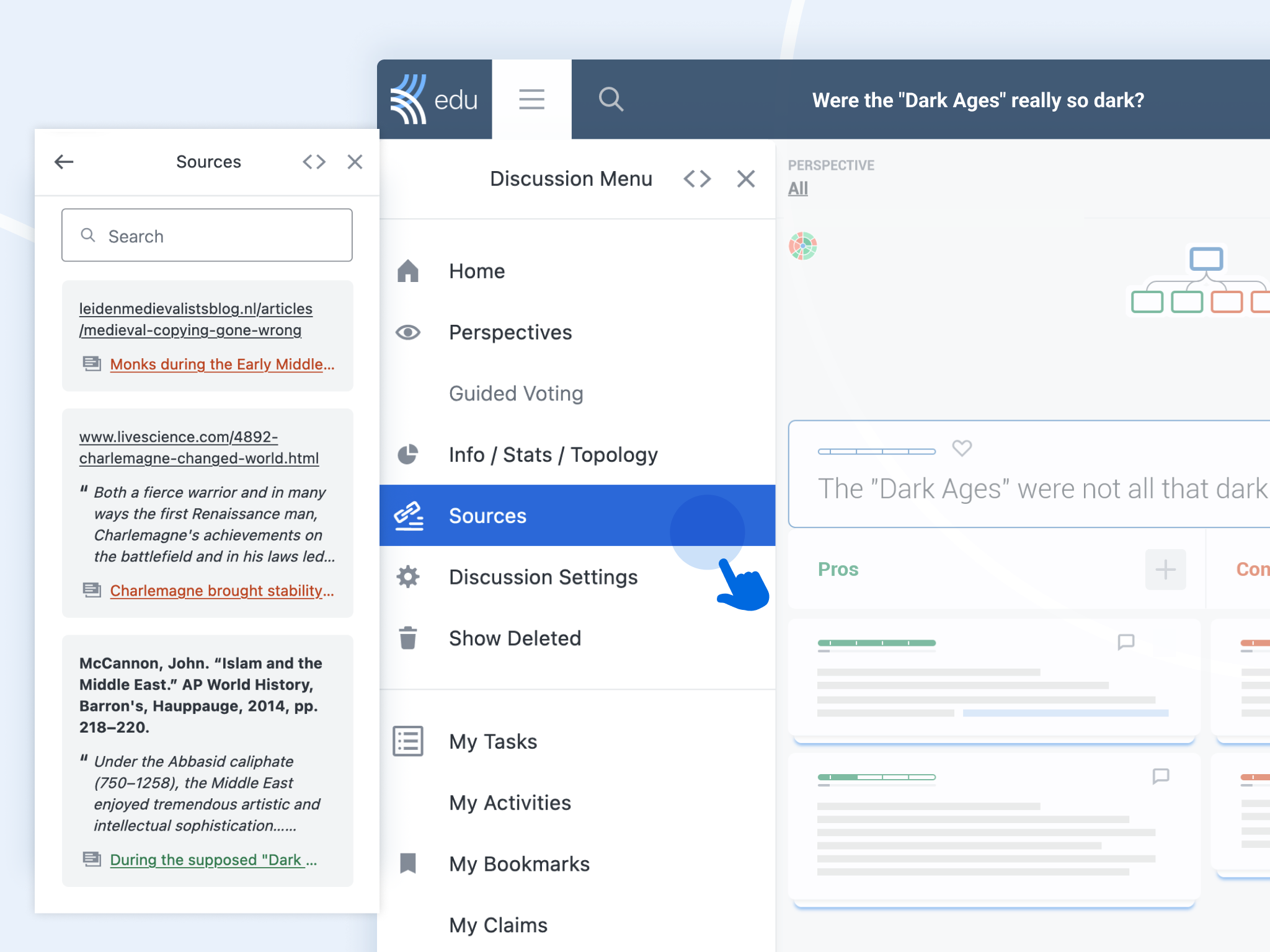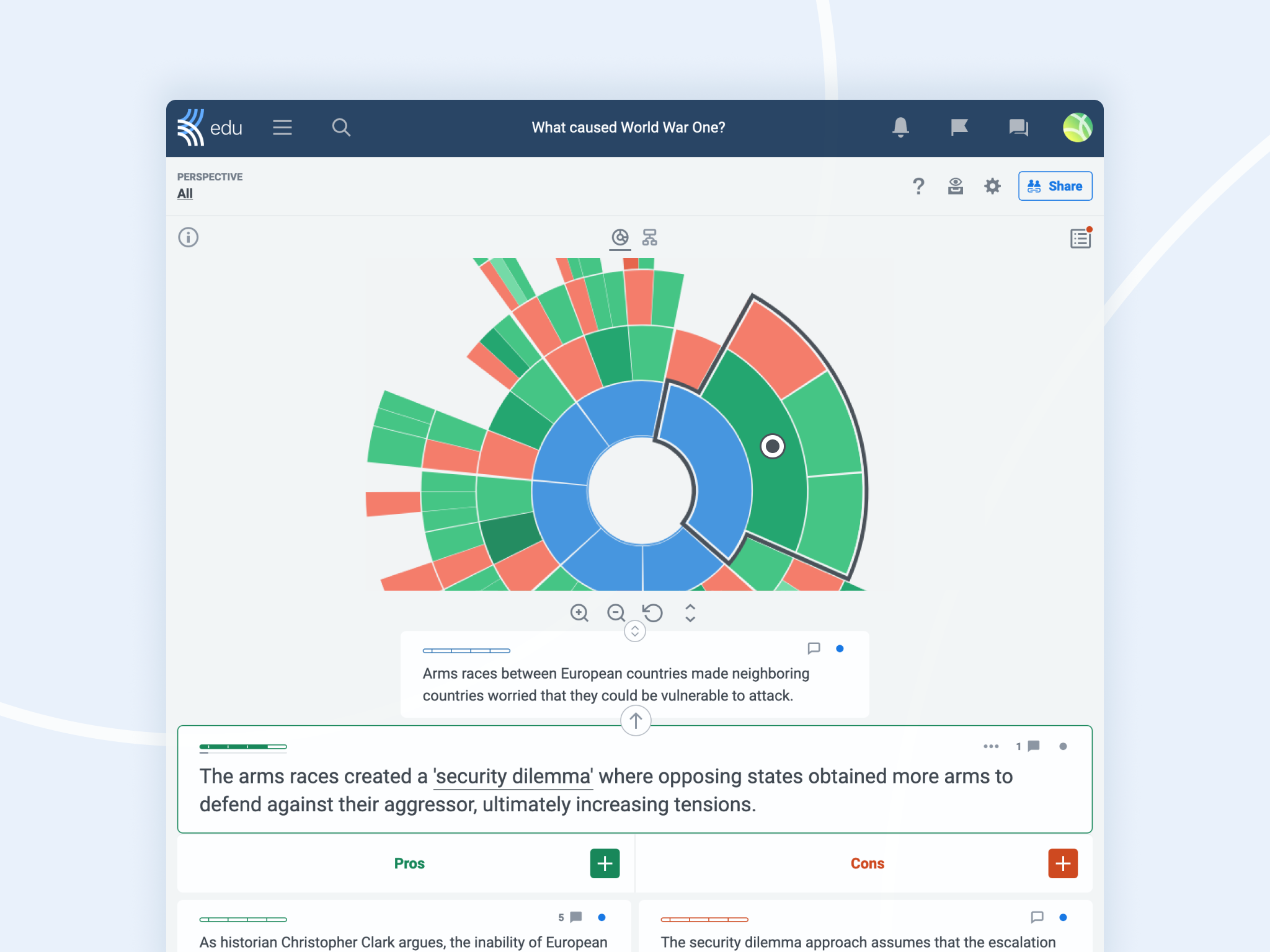- Skip to primary navigation
- Skip to main content
- Skip to primary sidebar
- Skip to footer
Don't Miss a Post! Subscribe

- Educational AI
- Edtech Tools
- Edtech Apps
- Teacher Resources
- Special Education
- Edtech for Kids
- Buying Guides for Teachers

Educators Technology
Innovative EdTech for teachers, educators, parents, and students

Examples of Critical Thinking Questions for Students
By Med Kharbach, PhD | Last Update: May 22, 2024

Critical thinking is an essential cognitive skill that entails the ability to reason, analyze, synthesize, and evaluate information. It goes beyond mere acquisition of knowledge. Instead, it involves deep, reflective thought, demanding us to question our assumptions, weigh evidence, and consider consequences. It’s about making clear, reasoned judgments. In essence, critical thinking is thinking about thinking, in a manner that allows us to improve the quality of our thinking.
In our daily lives, critical thinking helps us better understand ourselves, other people, and the world around us. It aids in problem solving, aids in the formation of beliefs and opinions, and encourages curiosity and creativity.
For example, when you’re faced with a major decision like purchasing a house, critical thinking enables you to weigh the pros and cons, assess the credibility of your sources of information, consider alternative options, and make a well-informed decision.
In professional situations, critical thinking is equally important. It helps us navigate complex work situations, make informed decisions, solve problems efficiently, and think creatively. For instance, if a company faces a decline in sales, critical thinking would help diagnose the root cause of the issue, evaluate different strategies to address the problem, and make effective decisions to rectify the situation.
The importance of critical thinking is particularly crucial for students. It provides them with the necessary skills to understand complex concepts, evaluate the credibility of sources, engage in thoughtful discussions, and develop reasoned arguments. It lays the foundation for lifelong learning and the ability to adapt to an ever-changing world.
This brings us to the concept of critical thinking questions . These are questions that are specifically designed to promote critical thinking. They go beyond factual inquiries, prompting individuals to analyze, synthesize, apply, and evaluate information. Critical thinking questions challenge the conventional wisdom and encourage individuals to think deeper, questioning the why’s and how’s.
They serve as a tool to spark intellectual engagement and stimulate thoughtful and reflective responses. As we delve further into this blog post, we will explore different types of critical thinking questions and how they can be applied in various contexts.
Related: Best TED Ed Lessons on Critical Thinking
Tips on Formulating Critical Thinking Questions
Creating good critical thinking questions involves understanding the basics of inquiry and knowing how to stimulate higher order thinking. Here are some tips and steps on formulating effective critical thinking questions:
Characteristics of Good Critical Thinking Questions:
- Open-Ended: Good critical thinking questions are typically open-ended, meaning they don’t have a single, simple answer. They invite students to think deeply and come up with their unique insights.
- Thought-Provoking: Effective questions challenge assumptions and encourage students to think creatively and critically. They provoke curiosity and exploration.
- Promote Discussion: The questions should stimulate meaningful discussions. The responses to these questions should not end the conversation, but rather, foster a deeper exploration of the topic.
- Clear and Understandable: The question should be framed in such a way that it is clear and easy to understand. Confusing questions can deter students from critical thinking.
Steps to Create Effective Critical Thinking Questions:
- Identify Your Learning Goals: Start by figuring out what you want your students to learn or achieve. Your question should align with these learning goals.
- Consider the Cognitive Level: Depending on the depth of thinking you want to stimulate, frame your questions accordingly. For instance, for higher order thinking, you might want to ask analysis, evaluation, or creation questions.
- Draft Your Question: Begin drafting your question. Remember, the best questions are open-ended and require more than a yes or no answer.
- Refine Your Question: Review your question. Is it clear? Does it promote discussion? Does it align with your learning goals? Refine as necessary.
- Test Your Question: Try out your question with a few students or colleagues to see if it stimulates the kind of discussion you’re hoping for. Be open to further refining your question based on the results.
Keep in mind that the goal of asking questions is not to ‘stump’ the students, but to promote intellectual engagement and thought. The best questions often lead to more questions, igniting a passion for learning and exploration.
Types of critical thinking questions
Critical thinking questions can be divided into the following categories:
1. Analysis Questions
Analysis questions ask the respondent to break a concept or idea into its component parts for examination. These questions can help uncover underlying structures, patterns, or meanings. They often involve words like “compare”, “contrast”, “classify”, “divide”, etc.
Example: “Compare the political ideologies of democratic socialism and laissez-faire capitalism. What are the similarities and differences between them?”
2. Evaluation Questions
Evaluation questions call for the respondent to make a judgment about the value of something, based on defined criteria. They often use terms like “critique”, “justify”, “validate”, “defend”, etc.
Example: “Evaluate the effectiveness of the government’s pandemic response measures. What were the successes and shortcomings?”
3. Inference Questions
Inference questions require the respondent to go beyond what is explicitly stated and make logical conclusions or predictions based on the information provided. Key words often include “infer”, “deduce”, “predict”, “conclude”, etc.
Example: “Given the recent surge in online shopping trends, what can you infer about the future of brick-and-mortar retail stores?”
4. Application Questions
Application questions involve applying knowledge or concepts to new situations or contexts. These questions often involve “applying”, “utilizing”, “implementing”, or “executing” learned knowledge.
Example: “How would you apply the principles of conflict resolution that we studied to resolve a disagreement in your workplace?”
5. Synthesis Questions
Synthesis questions invite the respondent to combine different pieces of information, ideas, or concepts to form a new whole or propose a solution. Words often associated with these questions are “design”, “formulate”, “propose”, “create”, etc.
Example: “Based on your understanding of climate change and renewable technologies, propose a comprehensive strategy for a city to reduce its carbon footprint.”
These types of questions, when used in the appropriate contexts, can help foster a deep level of understanding and stimulate higher-level thinking.
Examples of Critical thinking Questions
Here are some examples of critical questions that you can use to stimulate students’ critical thinking skills, encouraging them to analyze, evaluate, and create new ideas based on what they’ve learned.
- What do you think would happen if…?
- Can you explain why…?
- How would you solve this problem using different strategies?
- Can you compare and contrast these two concepts?
- How can you demonstrate your understanding of this concept in a different way?
- How would you categorize these items, and why did you choose to do it that way?
- What patterns or connections do you see in the information provided?
- How might you interpret these findings from another perspective?
- Can you design a…to…?
- How would you prove or disprove this statement?
- How can we improve…?
- What would be the consequences if…?
- Can you predict the outcome if…?
- What is the relationship between…?
- How can this be applied to other situations?
- What are the possible solutions for…?
- Why do you think that… happened?
- How can we test the validity of…?
- What alternative would you suggest for…?
- How can you illustrate this concept in a diagram?
- What would you recommend, and why?
- How is this similar to…?
- Can you make a general rule about…?
- How would you evaluate…?
- What evidence do you have for your claim?
- What are the implications of…?
- How does this contradict or confirm your understanding of…?
- Can you think of an example where…?
- How would you justify…?
- What do you think is the significance of…?
In conclusion, critical thinking questions are an indispensable tool for stimulating and nurturing the intellectual capabilities of students. They’re not just questions, but sparks that ignite the curiosity, analytical ability, and problem-solving skills in a learner. They invite students to dig deeper, challenge their preconceptions, and engage with material on a more profound level.
These questions play a pivotal role in taking learning beyond the simple absorption of facts into the realm of true understanding and application. They prepare students for the complexities of the real world, honing their ability to analyze situations, make decisions, and innovate solutions.
As educators and teachers, fostering this skill in students through the strategic use of critical thinking questions should be a top priority. So, let’s continue to question, to probe, and to encourage our students to do the same, for it’s in the exploration of these questions that true learning lies.

Join our mailing list
Never miss an EdTech beat! Subscribe now for exclusive insights and resources .

Meet Med Kharbach, PhD
Dr. Med Kharbach is an influential voice in the global educational technology landscape, with an extensive background in educational studies and a decade-long experience as a K-12 teacher. Holding a Ph.D. from Mount Saint Vincent University in Halifax, Canada, he brings a unique perspective to the educational world by integrating his profound academic knowledge with his hands-on teaching experience. Dr. Kharbach's academic pursuits encompass curriculum studies, discourse analysis, language learning/teaching, language and identity, emerging literacies, educational technology, and research methodologies. His work has been presented at numerous national and international conferences and published in various esteemed academic journals.

Join our email list for exclusive EdTech content.
50+ critical thinking questions for students

As the demand for critical thinkers increases, educators must prioritize developing students’ critical thinking skills. And, as critical thinking is a transferable skill, you can incorporate these critical thinking questions throughout the curriculum and across subjects!
At Kialo Edu , we’re committed to helping you nurture critical thinking in your students through engaging written discussions . We’ve carefully crafted a list of critical thinking questions designed to challenge students and empower them to navigate complex problems with confidence and creativity. Kialo is completely free and always will be , so why not try these questions with your students to build their critical thinking skills through discussion?
What is critical thinking?
Critical thinking is the skill of clear, rational thought. Critical thinkers go beyond accepting information at face value; they interpret and analyze information to form their own evidence-based conclusions.
They also approach questions from multiple perspectives , actively seek out opposing viewpoints, and challenge their own assumptions.
Why do students need to learn critical thinking?
Critical thinking enables students to articulate their perspective, make informed decisions, and solve problems effectively, thereby supporting their civic engagement .
Moreover, in the digital age, students can leverage critical thinking to question biases and assumptions and employ evidence-based reasoning to combat mis- and disinformation. Ultimately, mastering critical thinking equips students to succeed personally, academically, and professionally.
By using critical thinking questions throughout lessons, you can help students build a toolkit of critical thinking skills that they can apply to tackle complex issues now and in the future.
Critical thinking questions to evaluate evidence
In today’s information-rich world, students must learn to critically evaluate the evidence they use to support their viewpoints and make informed decisions. Applying these questions in a Kialo discussion will guide students to select the strongest sources to support their claims.
- How strong is the evidence supporting your argument?
- Are there any counterexamples?
- Are there opposing viewpoints that challenge your evidence?
- How have you ensured the accuracy of your evidence?
- How does this evidence relate to the argument?
- What are the limitations of this evidence?
- Can you summarize the main evidence used to support your argument?
- How do experts in this field view your evidence?
- What might the consequences be if this evidence is flawed?
- Are the inferences being made from the data legitimate?
- Why was this methodology used?
- Was an appropriate-sized sample used?

Critical thinking questions to challenge assumptions
Using critical thinking questions to challenge assumptions teaches students to critically examine their beliefs and thought processes. This helps them identify biases and gaps in their reasoning. Kialo’s “sunburst” mini-map can help support students in visualizing the overall discussion to check that they have presented a balanced overview.

- Can you describe the assumptions you are making?
- Why do you believe this is a valid assumption?
- What if this assumption is incorrect?
- Can you make an alternative assumption?
- What evidence supports your assumption?
- What would happen if we questioned this assumption?
- How does this assumption influence your argument?
- Are there any biases influencing your assumption?
- What is the basis for your assumption?
- What are the biases or assumptions behind the information?
- How have biases or assumptions affected the framing of the problem?
Critical thinking questions to analyze perspectives
- Can you explain any alternative perspectives on this issue?
- How might someone with a different background interpret this?
- How strong are the opposing arguments?
- How might culture influence perspectives on this topic?
- How would a skeptic respond to your argument?
- How might different groups of people view this issue?
- How does historical context influence this perspective?
- How might personal experiences have shaped this perspective?
- What are the implications of accepting this perspective?
Critical thinking questions to assess the validity of arguments
Kialo discussions display arguments visually in a branching framework, so students can easily assess the validity of pros and cons and improve their own arguments. Students can even use Voting and comments to evaluate claims!
- How did you select the evidence to evaluate this argument?
- How can you assess the reliability of this evidence?
- What are the strengths and weaknesses of this argument?
- How does this argument compare to others on the same issue?
- How might biases affect the evaluation of this issue?
- What benchmarks can we use to assess this claim?
- Is the reasoning logical and coherent?
- How well does this argument address counterarguments?
- Should we accept this position?
- How can you assess the value of this argument?
- Why is argument A better than argument B?
Critical thinking questions to explore consequences
- What if we had unlimited resources to solve this problem?
- How could we avoid this problem in the future?
- What if we approached the problem from a different angle?
- How would the outcome differ if we changed one variable?
- What might be the consequences or outcomes of this?
- How might this affect other outcomes?
- How might different stakeholders be affected?
- What are the long-term implications of this?
- What are the associated risks?
- Might there be any unintended consequences?
- How might this impact future developments?
- What would happen if this solution were implemented?
- How would you adapt this to create a different outcome?
Critical thinking questions to examine synthesis
- How do these ideas connect to our learning?
- How do these ideas connect to each other?
- Can you combine these viewpoints into a new perspective?
- Can you identify patterns among the different arguments?
- How can we integrate this new information into our understanding?
- What new conclusions can we draw from this evidence?
- How can we incorporate multiple perspectives in our solution?
- What is the overarching theme in these arguments?
- How might these ideas collectively influence future research?
- How do these findings relate to other research studies?
Critical thinking questions to prompt reflection
Using critical thinking questions for reflection not only gives students deeper insights into their own learning, but also fosters the development of key social-emotional learning skills like self-awareness, decision-making, and resilience.
- What did you learn from this?
- How has your perspective changed as a result of this evidence?
- What obstacles did you encounter while developing your argument?
- How do your personal beliefs influence your analysis?
- Can we identify any unanswered questions?
- How would you apply what you’ve learned to this situation?
- What insights have you gained about your own thinking?
- How do your personal experiences shape your understanding?
Use these critical thinking questions throughout your lessons to arm students with critical thinking skills for future success! Start by heading over to Kialo Edu’s Topic Library , where you’ll find hundreds of ready-made discussion prompts searchable by age and curriculum subject to maximize participation and build students’ critical thinking abilities.
We’d love to add your ideas to our inspiring list of critical thinking questions. Contact us at [email protected] or on social media.
Want to try Kialo Edu with your class?
Use Kialo Edu to have thoughtful classroom discussions and train students’ argumentation and critical thinking skills — completely free!
The Harriet W. Sheridan Center for Teaching and Learning
Questions to provoke critical thinking.
- Teaching Resources
- Classroom Practices
- Discussions and Seminars
Varying question stems can sustain engagement and promote critical thinking. The timing, sequence and clarity of questions you ask students can be as important as the type of question you ask. The table below is organized to help formulate questions provoking gradually higher levels of thinking.
Lower Levels
Higher levels.
1 From Alison King, “Inquiring Minds Really Do Want to Know: Using Questioning to Teach Critical Thinking,” Teaching of Psychology 22 (1995): 14.

- Search Search Search …
- Search Search …
47 Critical Thinking Questions for High School Students

Critical thinking is defined as analyzing and thinking objectively about an issue to form a judgment. Critical thinking skills are important for high school students because they encourage decision-making based on logic and reason, which will serve them well in adulthood.
In fact, it has been proven that having critical thinking skills leads to success in interpersonal, financial, and business endeavors and serves to protect against negative outcomes.
Critical thinking questions are those that encourage the development of the following skills:
- Problem-solving
- Communication
- Open-mindedness
Let’s review some of the best questions that encourage critical thinking in high school students .
If you could make your own country, what would it look like? What rules would your citizens follow?
If you could go back in time two years and give your younger self advice, what advice would you give?
If you found out you only had 24 hours left to live, what would you decide to do with your last day on earth?
If you were offered the opportunity to get on a spaceship bound for a distant planet, and you would be one of the first colonizers, would you do it?
If a train was heading down a track without brakes and you had the switch that would turn it to either one of two tracks, and there was a baby on one track and an old woman on the other, who would you choose to let live? Why?
If everyone in the world stopped using social media, would it be a good thing or a bad thing? Defend your answer.
If your best friend was doing something dangerous that could kill them or put them in jail, would you tell someone even if it meant never speaking to them again?
Should the voting age be lowered to 16? Why or why not?
Should euthanasia be legal? Why or why not?
Question 10
Is it better to take one life in order to save 5 lives? What about 10? 20?
Question 11
If you had the power to solve one major problem on earth, what problem would you solve?
Question 12
If you could transport yourself instantly anywhere in the world, what place would you choose?
Question 13
If you were stranded on a desert island, what item would you choose to bring with you, provided you would have an endless supply of food and water?
Question 14
Should the drinking age be lowered to 18? Why or why not?
Question 15
If you could spend one day with any person on earth, alive or dead, who would it be and why?
Question 16
Is it more important to have a strong military or universal healthcare? Why or why not?
Question 17
What defines adulthood? When does adulthood begin?
Question 18
Which is more important – solving climate change or solving world hunger?
Question 19
Would you rather be blind or deaf? Why?
Question 20
How would you describe a tree without using the words green, branches, or leaves?

Question 21
If you could describe the color red to a blind person, how would you describe it? What about the color blue?
Question 22
If you had the ability to transform into any animal at any time you wanted, what animal would you choose and why?
Question 23
If you could live in any historical time period, which time period would you choose and why?
Question 24
Would you rather die by falling off a skyscraper or being buried in a landslide? Why?
Question 25
How does someone become a good person? Can a bad person change into a good person? How?
Question 26
Would you rather to never have to eat or never have to sleep? Why?
Question 27
Is it better to have 1 million dollars in the bank or donate 10 million dollars to charity? Why or why not?
Question 28
How would you describe an airplane to someone who had never seen or heard of one?
Question 29
Is it better to be ignored or gossiped about? Why?
Question 30
What makes humans more important than animals?
Question 31
Is murder every justifiable? Why or why not?
Question 32
Is the death penalty immoral? Why or not?
Question 33
What characteristics make a good leader?
Question 34
If ignorance ever an excuse for breaking the law? Why or why not?
Question 35
What is more important in life: love, health, or money?
Question 36
Is it better to be feared or loved? Why?
Question 37
If you had the chance to travel through time and change one historical event, what event would you change and why? How would you change it?
Question 38
If you suddenly had a life expectancy of 500 years, would you change the way you live your life? What about if your life expectancy dropped 10 years?
Question 39
Think about the birth order with you and your siblings, if you have any. Would you rather change your birth order or remain where you are?
Question 40
If you had five minutes to defend the human race against an alien civilization who were going to destroy humanity, what would you say?
Question 41
Would you want to live forever? Why or why not?
Question 42
Is it the responsibility of wealthy countries to help impoverished countries? Why or why not?
Question 43
If you could change one rule in your family, what rule would it be and why?
Question 44
Do someone’s actions impact their value as a person, such as serial killers?
Question 45
How do you define evil?
Question 46
Is it the government’s job to ban harmful substances like drugs or alcohol, or is it the citizens’ responsibility to look after their own health?
Question 47
Should people be required to take a test before having a baby? Why or why not?
https://www.uopeople.edu/blog/why-is-critical-thinking-important/
https://www.futurelearn.com/info/courses/how-to-develop-critical-thinking-skills/0/steps/335512#:~:text=We%20develop%20specific%20techniques%20that,%2C%20independently%2C%20and%20effectively.%E2%80%9D
You may also like

How to Express Ideas Clearly: Effective Strategies for Communication
Clear expression is essential in both personal and professional settings. Being able to convey ideas clearly helps ensure that others understand your […]

What is historical thinking?
Historical thinking is something that more and more people are taking an interest in, but do you know what it really means? […]

Effective Argumentation Techniques: Mastering Persuasive Communication
To craft compelling and persuasive arguments, understanding key techniques is essential. These strategies apply to various formats like argumentative essays, persuasive writing, […]

Lateral Thinking in the Real World: Everyday Examples of Lateral Thinking.
The history of art, science, politics, warfare and business are full of examples of lateral thinking. Nelson’s famous victory at the Battle of […]
The Tech Edvocate
- Advertisement
- Home Page Five (No Sidebar)
- Home Page Four
- Home Page Three
- Home Page Two
- Icons [No Sidebar]
- Left Sidbear Page
- Lynch Educational Consulting
- My Speaking Page
- Newsletter Sign Up Confirmation
- Newsletter Unsubscription
- Page Example
- Privacy Policy
- Protected Content
- Request a Product Review
- Shortcodes Examples
- Terms and Conditions
- The Edvocate
- The Tech Edvocate Product Guide
- Write For Us
- Dr. Lynch’s Personal Website
- The Edvocate Podcast
- Assistive Technology
- Child Development Tech
- Early Childhood & K-12 EdTech
- EdTech Futures
- EdTech News
- EdTech Policy & Reform
- EdTech Startups & Businesses
- Higher Education EdTech
- Online Learning & eLearning
- Parent & Family Tech
- Personalized Learning
- Product Reviews
- Tech Edvocate Awards
- School Ratings
Best Services in St. Louis, MO-IL Metro Area
Best services in state college, pa metro area, best services in st. joseph, mo-ks metro area, a visitor’s guide to shenyang, china, a visitor’s guide to khartoum, sudan, a visitor’s guide to belo horizonte, brazil, a visitor’s guide to saint petersburg (leningrad), russia, best services in st. george, ut metro area, a visitor’s guide to pune, india, best services in stockton–lodi, ca metro area, 16 critical thinking questions for students.

Introduction:
Critical thinking is an essential skill for students to develop, as it enables them to analyze information, evaluate arguments, and make informed decisions. To enhance critical thinking abilities, students can engage with thought-provoking questions that challenge assumptions and encourage deeper reflection. In this article, we present sixteen critical thinking questions that will stimulate their cognitive abilities and foster intellectual growth.
1. What evidence supports this argument?
Assessing the evidence behind an argument encourages students to analyze whether it is sufficient, credible, and logically sound. This question teaches them to question the basis of statements and seek supporting evidence.
2. How can you apply this concept in real-life situations?
Connecting abstract concepts to practical scenarios helps students understand the relevance and applicability of what they learn. This question encourages them to think beyond classroom discussions and consider real-world implications.
3. What are the underlying assumptions in this statement?
Identifying assumptions allows students to recognize hidden biases or prejudices in arguments. By questioning underlying assumptions, they can develop a more nuanced understanding of complex issues.
4. Can you think of alternative explanations?
Encouraging students to consider alternative explanations fosters their ability to think critically and challenge initial conclusions. This question helps them explore different perspectives and understand that there can be multiple plausible interpretations.
5. How might different cultural perspectives influence this situation?
Recognizing the impact of cultural perspectives on opinions and decisions develops students’ cultural sensitivity and empathy. By considering diverse viewpoints, they broaden their understanding of complex issues.
6. What are the ethical implications of this decision?
Evaluating ethical consequences encourages students to consider the wider implications of their choices. This question enables them to develop ethical reasoning and become responsible decision-makers.
7. Can you identify any logical fallacies in this argument?
Recognizing logical fallacies helps students evaluate the validity of arguments and avoid common errors in their own reasoning. This question hones their critical thinking skills by identifying flaws in reasoning.
8. How might this situation change if key variables were altered?
By altering key variables, students can explore the potential impact of different factors on a given situation. This question enhances their ability to anticipate and evaluate different scenarios.
9. What are the potential biases in this research study?
Assessing biases in research studies equips students with the skills to critically evaluate scientific literature. This question prompts them to consider possible biases and influences on research outcomes.
10. What are the counterarguments to this position?
Encouraging students to examine counterarguments encourages them to think beyond their initial beliefs and consider opposing viewpoints. This question develops their ability to engage in respectful and constructive debates.
11. How does this information relate to your prior knowledge on the subject?
Connecting new information to existing knowledge aids student comprehension and reinforces critical thinking. This question prompts them to reflect on the relevance of new knowledge in relation to what they already know.
12. What are the short-term and long-term consequences of this decision?
Considering the short-term and long-term consequences helps students make more informed decisions. This question encourages them to think beyond immediate outcomes and consider broader impacts.
13. What are the potential biases in this news article?
Examining biases in news articles helps students distinguish between objective and subjective information. This question fosters media literacy skills and enables them to critically analyze news sources.
14. Can you identify any logical inconsistencies in this theory?
Identifying logical inconsistencies enables students to evaluate the coherence and validity of theories. This question promotes critical thinking by challenging the logical structure of theories.
15. How does this information challenge or confirm your existing beliefs?
Engaging with information that challenges personal beliefs helps students develop intellectual flexibility and open-mindedness. This question encourages them to critically evaluate their own perspectives.
16. What are the implications of this historical event in today’s society?
Connecting historical events to contemporary issues fosters students’ ability to recognize patterns and understand the relevance of the past. This question prompts critical analysis of history’s impact on the present.
Conclusion:
Engaging with these sixteen critical thinking questions will empower students to become active learners, capable of analyzing, evaluating, and synthesizing information effectively. By consistently challenging their assumptions, seeking evidence, and considering diverse perspectives, students will develop robust critical thinking skills that will benefit them throughout their academic and professional journeys.
How to Make a Fake Rock: 13 ...
14 times star wars pretty much summed ....
Matthew Lynch
Related articles more from author, 5 reasons i’m against classroom behavior charts (what i do instead), 12 tips, tricks, and ideas for teaching kindergarten, 12 best steam apps for students in the classroom and at home, 7 simple social studies activities that incorporate reading and writing, diy stress balls for your classroom, 5 secrets i have learned as a substitute teacher.

IMAGES
COMMENTS
May 22, 2024 · Types of critical thinking questions. Critical thinking questions can be divided into the following categories: 1. Analysis Questions. Analysis questions ask the respondent to break a concept or idea into its component parts for examination. These questions can help uncover underlying structures, patterns, or meanings.
Sep 18, 2024 · Ultimately, mastering critical thinking equips students to succeed personally, academically, and professionally. By using critical thinking questions throughout lessons, you can help students build a toolkit of critical thinking skills that they can apply to tackle complex issues now and in the future. Critical thinking questions to evaluate ...
Questions to Provoke Critical Thinking. Varying question stems can sustain engagement and promote critical thinking. The timing, sequence and clarity of questions you ask students can be as important as the type of question you ask. The table below is organized to help formulate questions provoking gradually higher levels of thinking.
Critical thinking skills are important for high school students because they encourage decision-making based on logic and reason, which will serve them well in adulthood. In fact, it has been proven that having critical thinking skills leads to success in interpersonal, financial, and business endeavors and serves to protect against negative ...
Nov 9, 2021 · Critical Thinking Questions Examples . Critical thinking questions are easy to spot. They’re questions that are worded so you can take a more in-depth look at things. They’re similar in nature to open-ended questions, in that it’s expected the person who’s being questioned will provide a substantive answer rather than a short one.
Spread the loveIntroduction: Critical thinking is an essential skill for students to develop, as it enables them to analyze information, evaluate arguments, and make informed decisions. To enhance critical thinking abilities, students can engage with thought-provoking questions that challenge assumptions and encourage deeper reflection. In this article, we present sixteen critical thinking ...